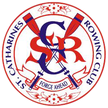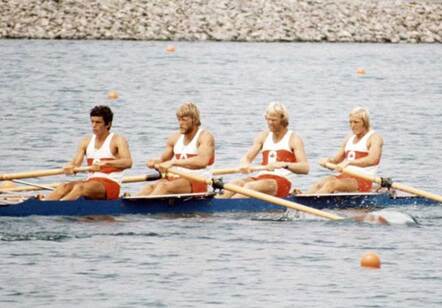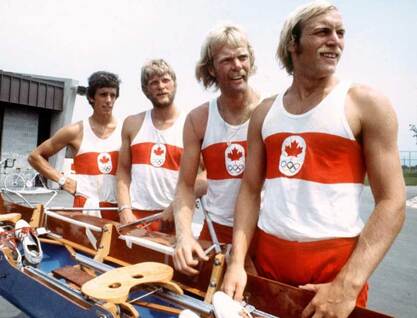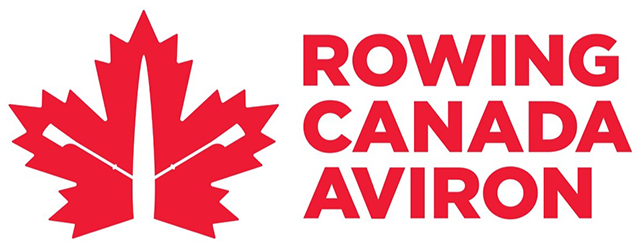|
The St. Catharines Rowing Club Presents: A Conversation with Andy Van Ruyven and Brian Dick
LK: How were you introduced to rowing? BD: Both Andy and I were born and raised in St. Catharines; and when you go through the high school system here and it’s impossible to not be exposed to rowing. I had a little more family history of rowing than Andy; my grandfather was a rowing coach, my uncle rowed in the 1960 Olympics, my father was the captain of the St. Catharines Rowing Club as well as my mother, who many years ago, was in the first ladies’ crew to row at Henley, so it was just ubiquitous. Whenever you are in St. Catharines, you are just exposed to rowing. As time went on, both Andy and I were tall, skinny, gangly kids, and I tried a lot of sports growing up; I was a jock from the word go. When I had to choose between hockey, basketball or rowing, it was rowing that won hands down. Given my nurturing, and my nature. "But I remember sitting on Canal Street looking over the Henley course from a very young age and I was just amazed by the beauty of the sport. And I remember thinking somewhere, someday, whenever I’m old enough, I’m going to do this sport." ~Andy Van Ruyven AVR: I wasn’t really introduced to it as much as I grabbed the bull by the horns. I was the third oldest of nine kids to hardworking Dutch immigrant parents. Other than working, they didn’t have any appreciation for sport whatsoever. But I remember sitting on Canal Street looking over the Henley course from a very young age and I was just amazed by the beauty of the sport. And I remember thinking somewhere, someday, whenever I’m old enough, I’m going to do this sport. So when high school came around, high school rowing was the first thing we could do. I, like Brian, was doing basketball and track, and working, but when it came down to it, in grade nine, there was no question as to whether I would try out for the rowing team. Brian’s uncle was actually my first coach at Denis Morris High School. I’ll never forget that because my father had an expectation that we would work on the farm on the weekends, I had to miss the first practice on a Saturday. But on Sunday I was able to attend, so we went down to the old rowing club, across the street from where the legion and the old rubber factory is. We put the boat in the water, but I had missed the tutorial of how to get in the boat. So, despite the fact that there was the warning “do not step here” stenciled onto the bottom of the boat, I didn’t know where else to step! So I put my foot right there that no sooner had I done that then the boat started to crack. So then Bill Dick, Brian’s uncle, grabs me by the scruff of my neck and chastises me vehemently for almost breaking the boat! I had every reason to quit rowing right then and there, but as soon as we got on the water, it was too late for that. The feeling of it all, the fluidity, the rhythmic nature. From then on, I didn’t want to do anything else except row. LK: It really is incredible to think about where we are as rowers, geographically. I think you both echoed that sentiment quite well that this is a special place to row. Just as you both did, I learned to row on the Henley, and just sort of assumed that the quality of the course, the volume of participation, and the caliber of coaches was the norm. But in reality, the St. Catharines Rowing Club is a very special place that we are geographically quite lucky to have as our home course. With that being said, what was your experience with the St. Catharines Rowing Club? "Once I had committed to the St. Catharines Rowing Club, I had no excuse to fail. They provided me with everything I needed to succeed: equipment, coaching, the course." ~Brian Dick BD: My introduction to SCRC club rowing was three years after the incident at my first practice when I almost broke the boat. Back then, you would row for your high school, graduate and then start rowing for the club. There were lots of other things to do in the summer during high school. And I should mention that up until that point, I hadn’t had a lot of success rowing; I enjoyed it, I wouldn’t have gotten out of bed that early every morning if I didn’t enjoy the sport and the people. But it wasn’t until my final year of high school that I won a race at CSSRA. By then, I had put on a couple pounds of muscle, and was becoming more of a heavy weight. There were people now, including my father, encouraging me to try the club program. But that first year, I never made the boat I was hoping to get in. So instead I was put in a pair, in which many guys didn’t last long due to frustration and would quit. But instead of quitting, my partner and I won Henley that summer! So what could have been the end of my rowing career, was really a blessing in disguise because it opened all these doors to small boat training and racing. I had a newfound confidence after that, and I got recognized by other coaches shortly after that. Once I had committed to the St. Catharines Rowing Club, I had no excuse to fail. They provided me with everything I needed to succeed: equipment, coaching, the course. At this point, Andy and I had barely crossed paths, but we didn’t start rowing together until 1970. But, actually, I haven’t heard Andy’s introduction to the club, so I’m looking forward to hearing it. AVR: I was 135lb when I was in grade 9, but the following year, I had to make weight, even though I had a growth spurt. I was just totally not fit to row 135lbs anymore. So then I put on muscle and started to row heavyweight. That summer, Jack Nicholson had noticed me for some reason and recruited me to row summer. But I didn’t know if I would be able to because of work obligations. But I tried to make it work, that was the summer of 1969, when the Canada Games were in Halifax. I was in the 8+, and we won! So now I suddenly had some visibility. The next year, the world rowing championships were in St. Catharines, and honestly my timing was pretty perfect because the national team was rebuilding at this point. So they took a chance on me and I rowed in a pair. It was in St. Catharines, I got my first track suit and walked in the opening ceremonies through Montebello Park. Now, we came dead last in everything, but it was a learning opportunity for all of us. The next year was the Pan Am Games in Calì, Valle del Cauca and I rowed in the 4- there when we came 4th. We were still rebuilding at that point. But then the next year was the Olympics, where I rowed in a 4+ with Rick Crooker, coached by Stan Murdza. We also went to Henley Royal in England that year, where we won the Prince Phillip Challenge Cup, as the first Canadian Crew to have won that event. LK: So many incredible experiences! Did you ever draw upon your experiences as an athlete to help you in another area of your life? AVR: I was a really shy kid growing up, and am still an introvert. Even though I was good at sports, I was never “that guy”. But what rowing allowed me to do was to learn some skills, and in turn gain confidence, and once you get recognized, it’s easy to feel like you can add value to a team. I was a business exec for most of my life, and when I was working in sales, persistence was the key, much like rowing. You have to keep trying when things get tough, and keep working when you’re turned down. Rowing was one of the most difficult things I have ever done, and because I did it, I can enter into almost any situation with confidence that it will be achieved, because I did much more difficult things when I was rowing. I used to coach kids at the Deep Cove rowing club in British Columbia, where I live now, and I would tell them, ‘whether you never row another stroke after this season, or the end of high school, or college, the fact that you’re getting up at 5am everyday to go out in cold, wet weather with blistered hands and tired muscles demonstrates that you have the foundation to be an exceptional human being’. BD: I completely agree with Andy. Sport is just a microcosm of life. If you continuously strive for success, or try to reach for the podium in life and sport, you are bound to be successful. LK: Were there any opportunities made available to you specifically because of your athletic career? AVR: Education wasn’t of the utmost importance in my family; the general expectation was to go school, get a job, get married, have kids and that’s it. But rowing allowed me to go to university and as a carded athlete, I was able to pay my tuition at Western. Had I never rowed, I shudder to think of what my life would have been like. BD: I can’t say there was one specific individual that changed my life, who I only would have met through rowing, but this sport got us out of our middle class existence. We didn’t follow our family’s footsteps in the world of work, but Andy and I were able to realize that there were choices and paths we didn’t know existed. When you’re jumping in a boat with Rhodes Scholars, and you just spent a summer in Europe, not just rowing and training, but also experiencing the culture, getting a broader perspective on life, you realize how big this world is. Lots of individuals helped along the way, but it was that big experience of being exposed to the world and other aspects of life.
LK: I’d like to talk a bit about your Olympic experiences. The Montreal Olympics were the first games to have Women’s Rowing, and the women’s team from that year was just inducted into the Rowing Canada Hall of Fame. Since you both had a close view of this moment in sport history, what was it like to watch this happening in addition to the general rarity of being an Olympian, and on the home team? AVR: Certainly, I can honestly say that the first time women were there for the first time didn’t register to me too much, other than that it was long overdue. The fact that it happened in Canada is a great thing for our national sport history, though. As far as rowing in the Olympics, I think back to Natalie (Mastracci’s) article in which she said, ‘you don’t row to go to the Olympics’. And I can honestly say that from the time that I started rowing, it wasn’t my focus. All I wanted to do when I got in that boat was to be the best athlete and rower I could be. And I remember all the years of rowing, I wanted to go one practice without a coach telling me to change or improve something. I think that happened three times. Our 4- was a group of total sticklers for detail that it was an absolute joy and pleasure to have been in that boat. If you do all the little things right, the big things take care of themselves. LK: My final question for you both is in regards to what advice you would give to certain groups of athletes. First off, what would you say to kids who have never rowed before and are interested in taking it up. AVR: There is no other sport like rowing. There are countless tales about the healing power of water, and it is absolutely true. You forget about everything else while you’re on the water, it’s just you, your oar, and making the boat go fast. It’s probably not for everybody, but if you want a unique experience, this is the one for you. LK: When I think of the uniqueness of this sport, the swans come to mind. There’s not many other sports where it’s 5am on a still body of water, and 5ft away from you is a swan. And he just makes eye contact with you; you two just co-exist on this body of water! BD: Absolutely! You know, even just to experience rowing recreationally, is an opportunity. That would be my advice to anyone who wants to try it, just to do it recreationally at the very least. LK: That’s a great plug for our Learn to Row program, Brian! That was how I got started, I was 12 years old, with no prior experience in the sport, it facilitated a great introduction to rowing. What advice do you have for high school athletes? BD: Don’t worry about the results, just enjoy the experience and learn the lessons you will carry with you for the rest of your life. AVR: I know it may seem too early for teenagers to think about character development, but it really is a perfect opportunity to learn how to push yourself. Take what you learned from the sport and translate them into the life skills you need. There’s not a single wasted thing you can do in sport. If you can recognize while you’re in the boat, “look, I know this is uncomfortable right now, but I can use these things later on. Unfortunately, people who don’t get involved in sport typically don’t have the same capacity to do that to the same level. I would take a good athlete and mentor them to success much easier than anyone else. Sport is such a great outlet for mental health as well. This is such a stressful time, and sport is such a great educator for a young person to learn how to cope with all the difficult things they may come across in life. AuthorLauren Kelly is a junior at the University of Notre Dame, where she competes on the rowing team and majors in history and Irish studies. A long time member of the St. Catharines Rowing Club, she recently stepped into the role of social media coordinator for the club. Comments are closed.
|
St. Catharines Rowing ClubThe St. Catharines Rowing Club has a long tradition of competing at the highest level in the sport of rowing. Categories
All
Archives
November 2023
|
Please Support Our Sponsors
SIGNATURE
PLATINUM
GOLD
SILVER
BRONZE
© 2014, St. Catharines Rowing Club
St. Catharines Rowing Club, P.O. Box 28010, 600 Ontario St., St. Catharines, ON, L2N 7P8.
St. Catharines Rowing Club, P.O. Box 28010, 600 Ontario St., St. Catharines, ON, L2N 7P8.


































